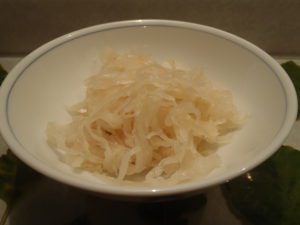Because of all the advertisements on tv—from wiggling hips to happy faces on bellies—most people know that one source of good bacteria is yogurt. Yogurt is made by adding bacterial cultures to milk to ferment it. This culturing process makes yogurt more easily digestible than milk alone because the live bacterial cultures create enzymes called lactase and beta-galactosidase to help with the breakdown of lactose, the milk sugar that causes many people digestive upset. Fermentation also partially digests the milk protein, casein, making it less likely to create an allergic response and making it easier to absorb.
So is yogurt the only food that is fermented and that provides probiotics?
 Nope. In fact people have been fermenting foods and drinks for thousands of years, from milk to breads to seabirds! Perhaps you don’t want to wrap a seabird in seal pelt and bury it underground for months. But, maybe you’ll enjoy kefir, sauerkraut, kombucha, kimchi, miso, or tempeh. If you are brave to try something different you may also like to try natto, a fermented soy product that I think tastes as bad as it smells and looks. However, in addition to being a source of good bacteria, natto also contains an enzyme called nattokinase that helps with breaking up tiny blood clots that can form and contribute to heart disease. It is also a popular food for many Japanese.
Nope. In fact people have been fermenting foods and drinks for thousands of years, from milk to breads to seabirds! Perhaps you don’t want to wrap a seabird in seal pelt and bury it underground for months. But, maybe you’ll enjoy kefir, sauerkraut, kombucha, kimchi, miso, or tempeh. If you are brave to try something different you may also like to try natto, a fermented soy product that I think tastes as bad as it smells and looks. However, in addition to being a source of good bacteria, natto also contains an enzyme called nattokinase that helps with breaking up tiny blood clots that can form and contribute to heart disease. It is also a popular food for many Japanese.
If these foods aren’t a part of your regular diet, that’s not surprising. The Standard American Diet (SAD) is sadly lacking in fermented foods, other than alcohol, of course. Even those foods like sauerkraut and pickles are often no longer as healthy as they once were. They are now preserved in vinegar instead of the traditional bacteria-salt combo. Mass produced sauerkraut is also usually pasteurized which leaves it lacking in both tastes and nutrients.
But wait, why are probiotics important?
Aside from the commercials that show arrows pointing down over flat bellies, indicating that bowel regularity is improved and bloating is reduced, probiotics have many other benefits. These benefits include helping to protect against colon cancer, improving digestive disorders, treating skin issues like eczema and psorasis, and supporting the immune system.
Ask yourself how you can add fermented foods into your diet and enjoy the health perks!
